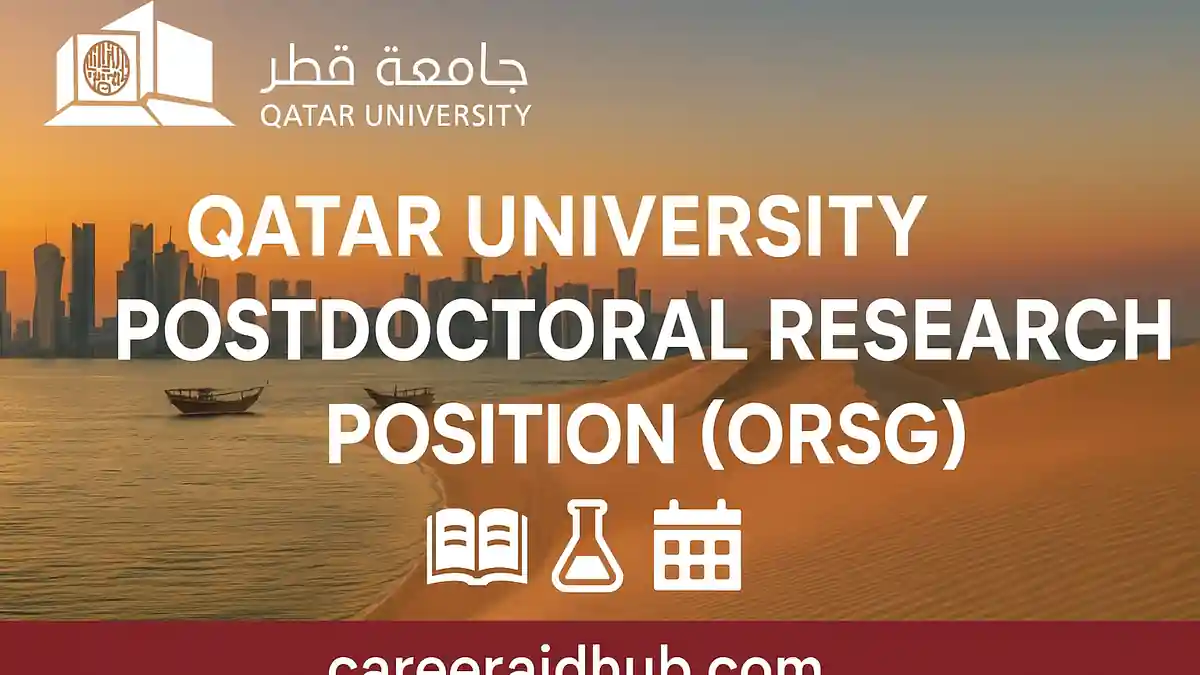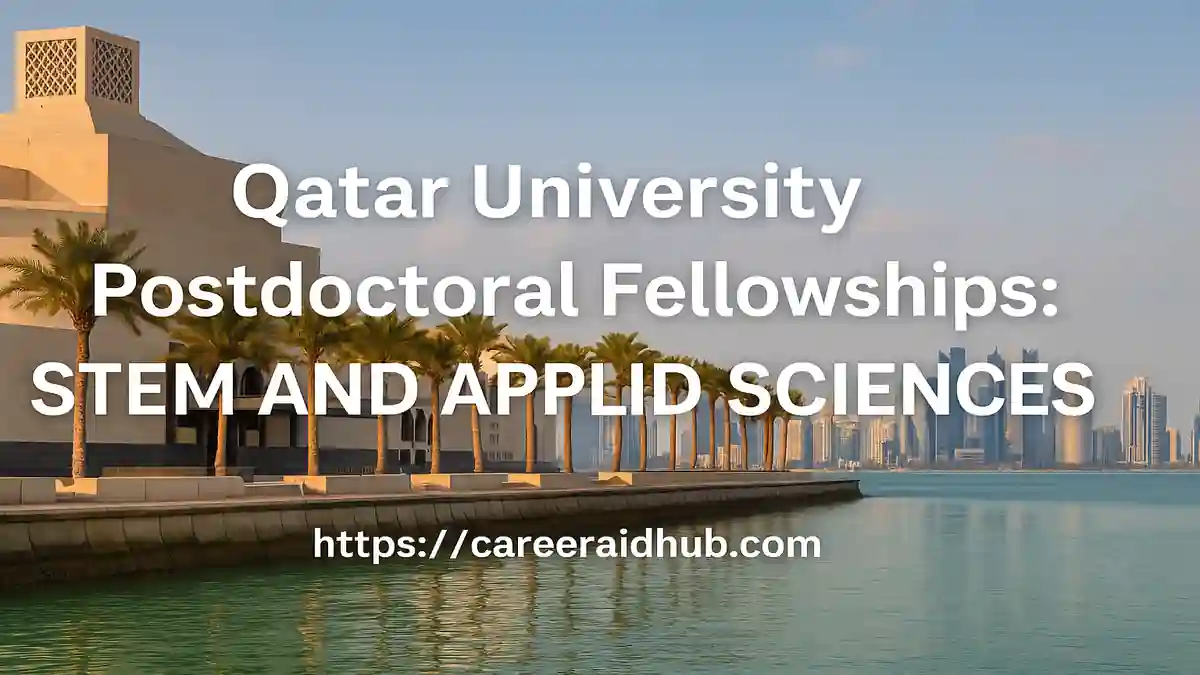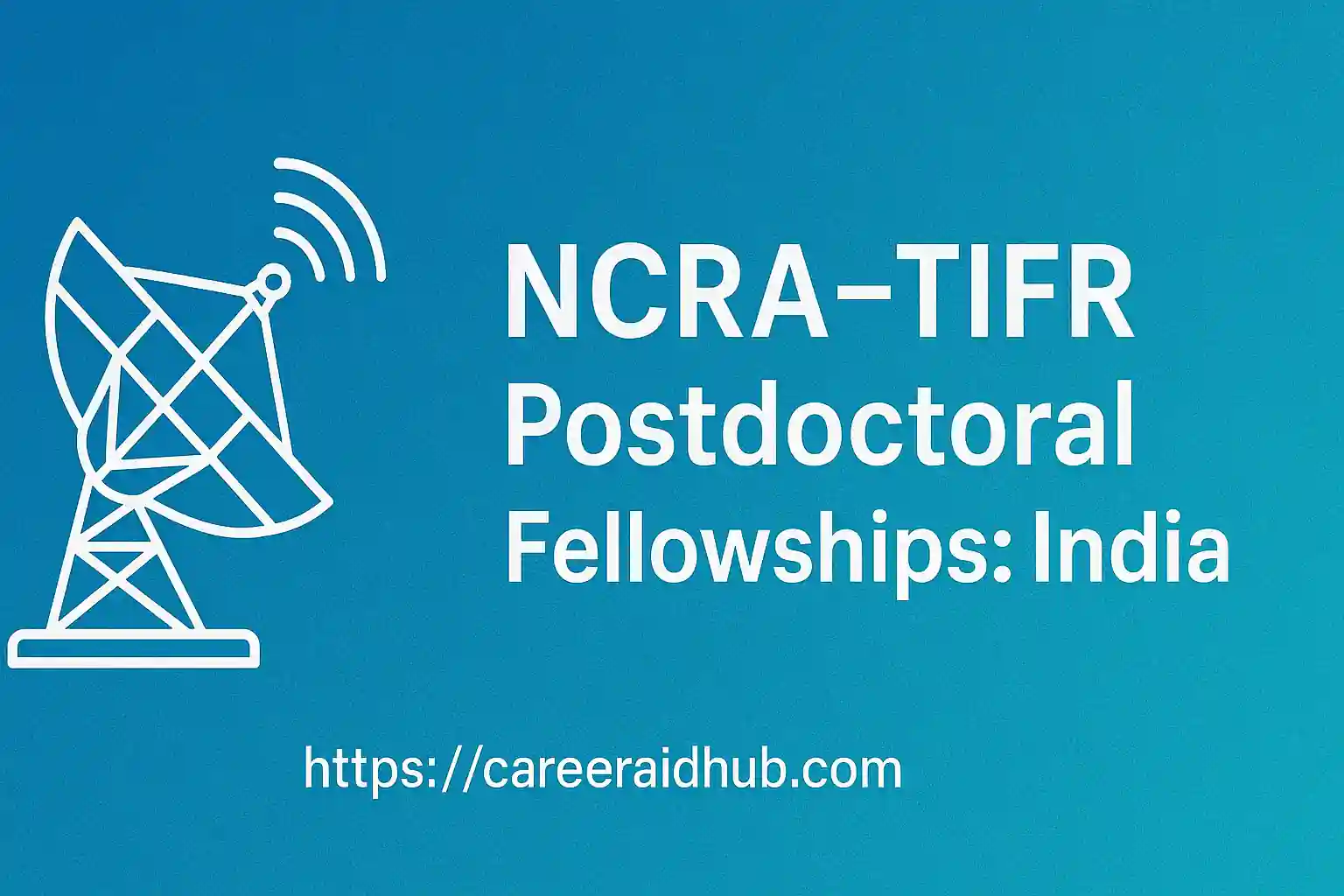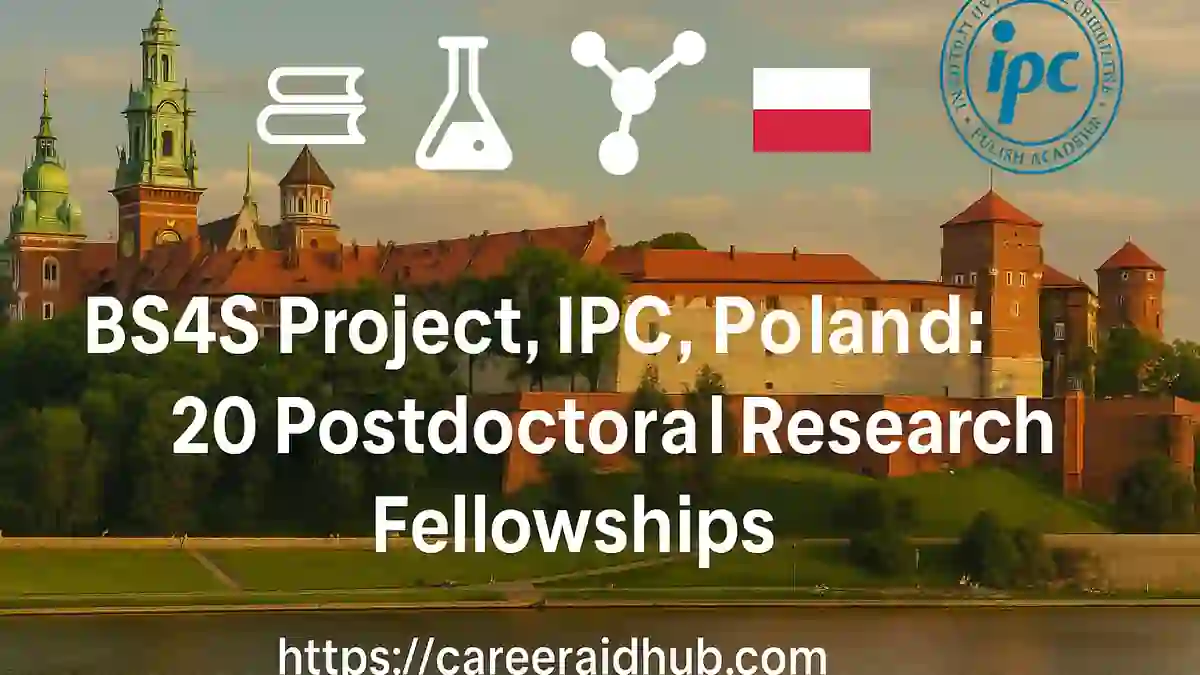Qatar University (QU)—the State of Qatar’s national research university—periodically recruits postdoctoral researchers through its Office of Research Support (Grants & Contracts). An archived call outlined a 24-month appointment, a tax-free annual package, and a Fall 2023 start, with a mid-December deadline. Treat those figures as historical guidance and confirm the live round for current terms.
Qatar University’s Postdoctoral Research Position offers a competitive, tax-free package, strong mentorship, and project-driven outputs aligned with national priorities. This guide explains benefits, eligibility, required documents, selection criteria, and timelines—plus expert tips to strengthen your application and prepare for the upcoming cycle at the Office of Research Support (Grants & Contracts).
Why Consider a QU Postdoc?
Reputation and Research Ecosystem
As Qatar’s flagship public university, QU supports applied and mission-driven research across engineering, energy and environment, health sciences, computing, and the social sciences. The ecosystem encourages cross-college collaboration and sustained engagement with national stakeholders.
Tax-Free Compensation and Practical Value
Compensation has historically been advertised as tax-free in Qatar, which meaningfully increases take-home value. Moreover, benefits are typically aligned with institutional policy, improving overall relocation feasibility for international scholars.
Program Structure, Mentoring, and Measurable Outputs
justify;">QU’s model emphasizes clear deliverables—publications, datasets, prototypes, and presentations—developed under faculty mentorship. In practice, that means setting early milestones, maintaining a reproducible workflow, and aligning outputs to QU’s thematic priorities.
Position at a Glance (Archived Call)
Title: Postdoctoral Research Position in Qatar University (ORSG)
Host: Office of Research Support (Grants & Contracts)
Term: 24 months (historical call indicated a Fall 2023 start)
Compensation: Historically advertised as a tax-free annual package, plus benefits per QU policy
Deadline (archived): Mid-December (historical guidance)
Fields: Multidisciplinary projects aligned to QU priorities; topics vary each cycle
Note on future rounds: Later stages have reflected updates to offers and topic clusters. Always rely on the current ORSG announcement for stipend, benefits, eligibility nuances, and documentation requirements in your cycle.
Who Should Apply?
Academic Background and Research Fit
Applicants should hold a PhD in a field that maps to QU’s priorities. Beyond the degree, evaluators look for a coherent scholarly arc: a well-defined research agenda, consistent methods, and evidence of momentum.
Publication Profile and Research Quality
A competitive track record typically features Q1/Q2 journal articles or equivalent outputs in your discipline. Rather than listing everything, foreground 3–5
flagship works that illustrate depth, methodological rigor, and field impact.
Collaboration, Mentorship, and Team Science
Because QU projects often cut across labs and centers, demonstrate ease with multidisciplinary collaboration. Emphasize mentoring experience (e.g., guiding undergraduates or master’s students), openness to co-designing protocols, and willingness to share data/code within project guidelines.
Typical Responsibilities
Research and Deliverables
You will conduct original, publishable research that advances the host project. Define an 18–24-month plan with milestones (method setup, pilot data, manuscript submission, conference presentation), and show how each output links to measurable impact.
Mentoring and Training
Expect to coach junior researchers on methods, writing, and reproducibility. Develop simple lab SOPs, maintain version-controlled repositories, and use shared dashboards for progress tracking.
Proposal and Dissemination Support
Where appropriate, support proposal drafting, budget notes, and risk registers. Additionally, present findings at seminars, workshops, and conferences—prioritizing venues that reach end users and strategic partners.
Salary & Benefits (What to Expect)
Compensation: Historic calls described a tax-free annual package for postdoctoral researchers. Subsequent stages have indicated updated figures. Always verify the active round.
Benefits: Benefits align with QU policy and may include institutional provisions that support relocation and research productivity. Specifics depend on the cycle, project, and contract.
How to Apply (What to Prepare)
Document Checklist
CV with complete publications, selected metrics where meaningful, and links to open repositories.
Cover Letter mapping your expertise to the project and QU priorities.
Research Statement (1–2 pages) outlining aims, methods, timelines, and intended outputs.
Selected Works (2–3 best papers or equivalent outputs) with a short contribution note.
Referees (names, affiliations, emails) prepared to respond quickly.
Compliance Items (if requested): ethics approvals in progress, data-management plan, and equipment needs.
Submission Workflow
Follow the live ORSG instructions precisely (portal forms, file formats, and field limits).
Name files consistently (e.g., Lastname_Firstname_QU-Postdoc_2025_CV.pdf).
Use a single master PDF where permitted to preserve formatting across systems.
Confirm time zone cut-offs (Qatar Standard Time) before submitting.
Formatting and Readability
Keep sectioning clear with H2/H3 equivalents inside your PDFs;
use accessible figure captions; and avoid dense blocks of text. Review line spacing, margins, and export settings to ensure screen-friendly files.
Timeline & Selection
Historic Rhythm (For Planning)
Previous rounds indicate a late-year application window, with reviews and onboarding in the following terms. Expect multi-stage screening focused on scholarly fit, methodological strength, and feasibility.
Next Cycle Forecast
Based on past patterns, Dec 2025 – Jan 2026 is a reasonable expectation for the next window (month/year only). We will update soon when the official notice appears.
Evaluation Focus
Committees look for alignment with QU priorities, a realistic workplan, documented collaboration capacity, and potential for high-quality outputs. Strong letters that speak to independence and grit help significantly.
How to Stand Out (Expert Tips)
Demonstrate “Net-New” Value
Show techniques, datasets, or infrastructure you bring that the host currently lacks. If you can shorten a critical step (e.g., preprocessing or model calibration) by weeks, quantify the gain.
Prove Rigor and Reproducibility
Share a link to a clean, anonymized repository that mirrors your methods: environment file, notebook templates, and a brief README with run instructions. Add a short data-governance note.
Engage the Ecosystem
Identify two QU labs/centers you would actively collaborate with, and describe a concrete joint activity (shared measurement campaign, code clinic, or joint seminar) that creates mutual value.
Conclusion
Qatar University’s Postdoctoral Research Position offers a practical route to impactful, mentored research with measurable outputs and a competitive, tax-free package. Use the guidance above to prepare a rigorous, timely application—and verify current terms, documents, and deadlines on the live ORSG page before you submit.
Feature Snapshot (Fill-and-Keep)
| Feature | Details |
|---|
| Program Name | Qatar University — Postdoctoral Research Position (ORSG) |
| Host Country | Qatar (Doha) |
| Funded By | Qatar University — Office of Research Support (Grants & Contracts) |
| Duration | 24 months |
| Study Mode | Full-time (on campus) |
| Eligibility | PhD in a priority field; strong publication record; fit with QU priorities; readiness to collaborate |
| Financial Support | Tax-free annual stipend (historical guidance), plus benefits per QU policy; project-dependent allowances may apply |
| Fields of Study | Engineering; Energy & Environment; Health; Computing/AI/Data; Social Sciences; and allied areas |
| Deadline | Next cycle forecast: Dec 2025 – Jan 2026 (month/year only; we will update soon) |
| Official Website | Official Link |
Frequently Asked Questions
What is the Qatar University postdoctoral research position?It is a full-time, project-aligned postdoc at Qatar University that prioritizes high-impact research outputs, mentorship, and collaboration under the Office of Research Support (Grants & Contracts).
Is the Qatar University postdoctoral stipend tax-free?Qatar normally provides tax-free compensation. However, verify stipend and benefits in the active ORSG announcement and confirm your personal tax situation with a qualified advisor.
Who is eligible for the Qatar University postdoc?Candidates typically hold a PhD in a relevant field, present strong publications, align with QU priorities, and demonstrate capacity for collaborative, interdisciplinary research.
What documents are required for the QU postdoc application?Usually submit a CV, cover letter, research statement, two or three key publications, referee details, and—if requested—ethics or data-management notes aligned to project needs.
Which research fields does the QU postdoc cover?QU supports engineering, energy and environment, health, computing/AI/data, and social sciences; nevertheless, the exact topics vary by cycle and project.
When do applications open for the next QU postdoc cycle?ORSG typically opens late in the year; therefore, expect the next window around December–January. Nevertheless, monitor the ORSG blog for definitive dates.
Does Qatar University provide housing or accommodation benefits to postdocs?Benefits follow institutional policy and may include housing-related provisions. However, verify your entitlement in the current call before budgeting relocation expenses.
What are the visa and work-permit steps for QU postdoctoral researchers?After selection, QU usually sponsors visas and work permits. Meanwhile, keep your passport, attestations, and degree verifications ready to expedite onboarding.
Do QU postdocs have teaching duties in addition to research?Primary focus remains research; yet some units may assign limited teaching or mentoring. Consequently, confirm expectations with your host PI during offer negotiation.










